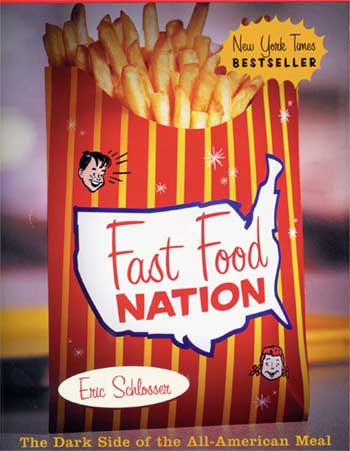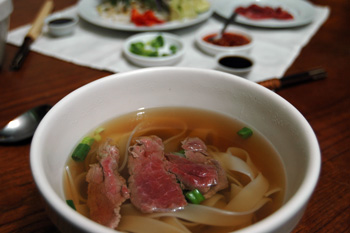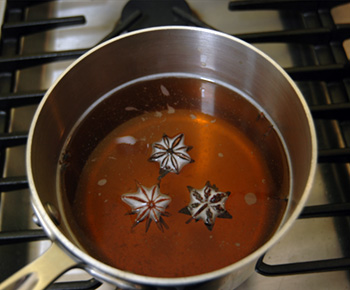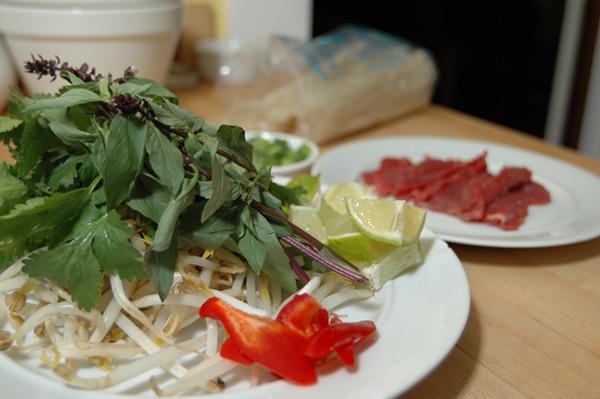Pho – in Denver is – cheap. Pho is beef broth, rice noodles, nearly raw meat, chili, bean sprouts, lime and a mounded pile of green-leaf herb, usually Thai basil and a saw-toothed cilantro.
Eric Schlosser writes about cheap food in Fast Food Nation. He spoke at Denver University last night as part of the Denver Post Pen & Podium series. I was one of the many believers who filled the auditorium to hear Schlosser talk about how fast food has killed our food supply. How Ray Kroc made a fortune making our food Uniform, Cheap and Fast. I wouldn’t be caught dead in a fast-food place, but I do find myself willingly going out for a PHO.

Eric Schlosser wrote about our desire for cheap food in Fast Food Nation. He spoke at Denver University last night as part of the Denver Post Pen & Podium series. I was one of the many believers who filled the auditorium to hear Schlosser talk about how fast food has killed our food supply. How Ray Kroc made a fortune making our food Uniform, Cheap and Fast. I wouldn’t be caught dead in a fast-food place, but I do find myself willingly going out for a PHO.
One taste worldwide. That’s what Schosser said was McDonalds slogan. The thought of that, he said is ‘really creepy.’ And I’m feeling proud of myself for being an adventurous eater dining at local-ethnic places. I won’t conform; I want to eat everything and I want it different every time. I breath in the Pho broth that I slurp up with a horde of other diners who are less discerningly dumping in chili sauce and other strong condiments. I try places with nice ambiance and those where we’re packed in on cheap cafeteria tables. I form an opinion that Pho79 has a much more balanced and aromatic broth than Pho95 just down the block on S. Federal.
Then Schlosser said another creepy thing: one fast-food burger patty born in 2011 can contain meat from up to 100 animals. He reiterated what we, the audience, already knew about how long the scare of an outbreak of food-borne illness can last. Problems are hard to contain because of mass distribution, we can’t easily trace trouble to a source and then correct the cause. Take for example, the salmonella eggs last summer. Think of mad-cow disease.
 Then, I thought about my Pho restaurants. I don’t ask where the beef broth comes from. Or the beef. Of course, there’s the language barrier. I don’t speak Vietnamese. Maybe what I want is ignorance, and it’s accompanying bliss. Maybe that’s what the food industry has been trying to provide for me and the fat people walking into McDonalds. Ignorance and bliss.
Then, I thought about my Pho restaurants. I don’t ask where the beef broth comes from. Or the beef. Of course, there’s the language barrier. I don’t speak Vietnamese. Maybe what I want is ignorance, and it’s accompanying bliss. Maybe that’s what the food industry has been trying to provide for me and the fat people walking into McDonalds. Ignorance and bliss.
A woman in the audience at DU asked, ‘I’m a vegetarian so I don’t have to worry about what you’re talking about, but what do you think about alfalfa now being Genetically Modified?’
Alfalfa, he answered, is a perennial. (I didn’t know this or that it’s now GMO) The concern, he continued, is that once a genetically modified perenial is introduced, it will propagate. No reining it in when we decide we don’t want genetically-modified alfalfa. And yes, he said ‘when.’
Because as Schlosser pointed out our food system changed without our knowledge over the past 40 years. We didn’t debate it, vote for it. It changed without our knowledge because industrial food suppliers didn’t, and still don’t, want us to know what’s in our food – it would scare us. So, slowly local butchers became rare, tomatoes became tasteless, one-off diners disappeared and mcRestaurants propagated. Behind the curtain was the industrialization of fruits and vegetables and cultivators turned to assembly-line workers. Until we started demanding organic and local. And this is why Schlosser thinks we are on a path to change the food system back to something better.
But the organic food movement is being criticized, Schlosser said, being called ‘Elitist’ by Sarah Palin. Yes, organic, non-processed food is more expensive, he said. “Right now it’s only 1 percent of our food production, but calling it elitist is like calling seat belts elitist. The wealthy will always had access to good food. It’s the poor who are suffering most (from the change to cheap, uniform and industrial food.) Just look at obesity rates, he said: 1 in 3 nationwide; of the poor: 1 in 2 people are obese.
If I’m an elitist because I support organic food, someone will probably also assume I’m a liberal – because I am open mind and will order tripe and tendon in my Pho.
But I’m Conservative – that’s what I really am – Schlosser pointed out, saying that he, and I, want to conserve the land, keep our resources clean and uncontaminated, and we want people and animals treated with respect. The big-business pork lots and corn- and soybean-subsidy funded industrial farms are UnAmerican. I’m the true American.

This American makes a Fresh Dinner: I look up the recipe for Pho. If I want that taste must I go out where the beef isn’t guaranteed to be organic or decently treated.
‘Rock candy. Buy Pho spices in a packet. If you’ve read any of my blogs or articles you know I hate recipes like this. Corn syrup is not necessary for my health, but I’ll bet it’s in the rock candy and maybe the spice packet, too. And I can’t read non-Roman characters even if the ingredients are labeled.
I know Pho is generally made with beef stock, and instead of opening a can, I use homemade beef stock from a cow whose previous address I know. Added to that are a couple of star anise, a nutmeg, clove, cinnamon stick, white pepper, (from Savory, my local spice shop), an onion outer layer, a slice of fresh ginger, sage from the garden and a tablespoon of local honey. And some anchovy paste. Anchovies are what fish sauce is made from, and I know that my tube of anchovy paste is made in France where they have regulations about what they put in food. I’m not so sure about the fish sauce. It’s minor, I know, but I’m on a mission tonight. To make a cheap meal in a pure way.
The rice noodles ingredient are rice flour and water. They’re the extra large variety, meaning wide, and so they need to boil for 8 minutes. Yes, the package came from half way around the world, and I’m looking for a better option.

Raw beef (flank steak, organic) has been in the freezer and it is cut thin. Bean sprouts, cilantro, Thai basil, slivers of fresh red chili pepper and lime are brought to the table. I substitute more lime and chili slices to avoid using the bright red chili sauce that we can’t resist buying in the Asian market. The particular chili I’d bought just wasn’t very hot. That’s the trouble with natural produce – it’s just not as consistent as “One Taste Worldwide.” But it was hot enough for sinus-clearing and smell enhancing. We slurped our soup and thought about what spice I’d used too little, and which one I’d used too much.
At one point, I squeeze in another wedge of lime and ‘wow’ it was zinging. Perfection. Right there in my bowl. Later, I ladled in another few spoonfuls of the left overs, I realized again how perfect it had been. The next taste is not much worse, but is constantly changing. I get very subtle new impressions with every bite. I want more of this. I want different basil options next time, my own cow’s tripe and tendon. I want to make chili sauce. I want my little elitist arugula sprouts to get bigger so they can join in the PHO.
